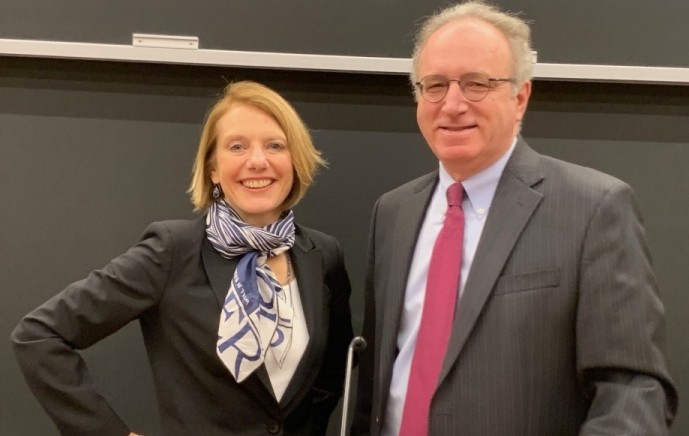
On Tuesday, January 28, the Kernochan Center began its Spring IP Speaker Series with a discussion of the Copyright Alternative in Small-Claims Enforcement (CASE) Act. Nancy Wolff (Cowan, DeBaets, Abrahams and Sheppard LLC) and Jonathan Band (Jonathan Band PLLC) debated the proposed small-claims tribunal. Wolff argued that this cheaper alternative to federal litigation was a clear necessity, since the existing procedures for the pursuit of copyright claims are expensive and time-consuming, especially for individual artists pursuing multiple copyright violations. Band, however, advanced several points against the tribunal. First, he argued,that the opt-out system may unfairly deny someone their right to a trial by jury. He also noted that there are currently no other small-claims tribunals with jurisdiction over federal matters, and expresssed concern that the system will be easily abused by "copyright trolls," parties that bring hundreds of suits, some unjustifiable, in an effort to force a monetary settlement. The House approved the bill in November. The Senate is currently considering the legislation. For more on the CASE Act, read this.
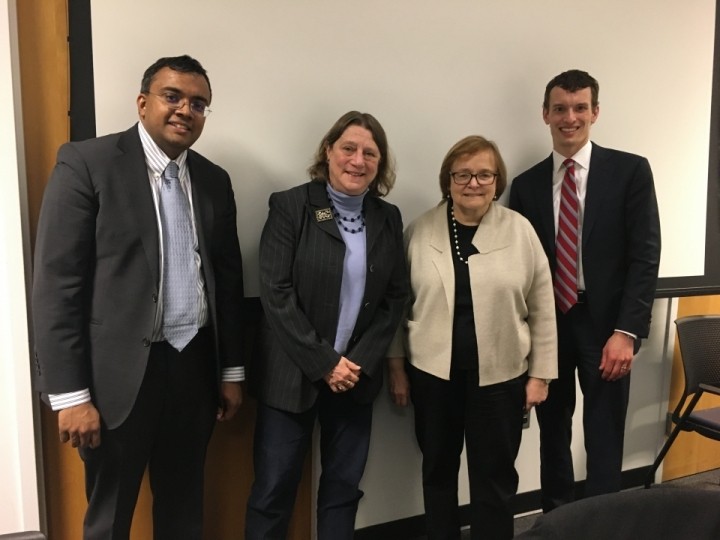
The following Tuesday, February 4, the speakers were Shyam Balganesh (University of Pennsylvania Law School) and Joshua Johnson (Vinson & Elkins LLP) discussed State of Georgia v. Public Resource Org. (PRO). At issue was the Official Code of the state of Georgia Annotated. The state contracts with LexisNexis which provides annotations to give the law more context and discuss the case law interpretations of the official code. Although the Code itself states that the annotations are part of the official code and that the statutory portions “shall be merged with annotations,” Georgia law says that the annotations themselves do not have the force of law. Thus, the state argues, the annotations are copyrightable. PRO, however, argues that because of the state's supervisory role in the creation of the annotations, and because the annotations are integrated into the official code (Georgia calls this product the Official Code of Georgia Annotated), they should be considered government-produced works which are not copyrightable.
Johnson – who argued the case before the Supreme Court in December - related the state’s argument that courts have ruled that annotations in general are copyrightable as derivative works, and there is nothing that says state law annotations are not copyrightable. In fact, he noted, in drafting the current Copyright Act, Congress referred to studies done in 1959 and 1961 which summarized the government edicts doctrine and concluded, based on 19th century case law, that state government works are copyrightable. (This matter was also discussed in the hearings leading up to the 1909 Act, where there was discussion of excluding all state works from copyright protection but Congress declined to do so). Balganesh, who wrote an amicus brief in support of the defendant, Public Resource Organization, agreed that while laws are not copyrightable, annotations generally are. But he questioned the role of these particular annotations, and what principles govern them. He noted that LexisNexis produced these annotations under the direction of the state of Georgia, a law-making authority. Since, he argued, the annotations made no sense without the text of the law, and because the state had integrated the annotations so fully into the Code of Law so as to make the Code and the annotations inseparable, the annotations were government edicts and not copyrightable.
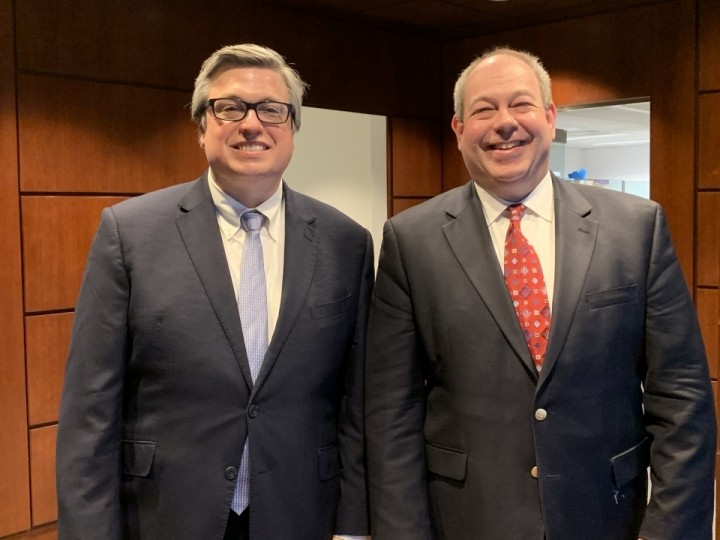
On February 25, Joseph Gratz (Drurie Tangri) and Steve Tepp (Sentinel Worldwide) discussed the upcoming arguments before the Supreme Court in the Google v. Oracle case. The case involves Google's use of Oracle's Java Application Programming Interfaces in the development of Google's Android operating system. Gratz, who wrote an amicus brief in support of Google, argued that the tech giant did not violate Oracle's Java copyright because it did not copy any of the program's underlying code. Instead, he said, it copied the name of the method Oracle used, a list of possible demands that the program could accept. He said the commands at issue were an unprotectable interface and not traditionally copyrightable computer programs. He was concerned about the impact this case would have on other technology that depends on the use of similar commands, like technologies that aid the visually impaired or the chronically ill.
Tepp, who also filed an amicus brief in the case, countered that Google took material that it could have generated itself, but instead relied on Oracle because it wanted to rush to market its product, the Android cell phone, which has an operating system reliant on Java. Furthermore, both Apple and Microsoft developed different operating systems for their mobile devices, demonstrating that there was no need for Google to copy from Oracle to make its applications function. Furthermore, Tepp pointed out that Oracle offered an open source license for its product, but the license would have required Google to make freely available any code it added to the copied material. Unwilling to share its innovations, Google instead copied over 11,000 lines of code.
More materials about the case are available here. It will be argued before the Supreme Court on March 24, 2020.
The IP Speaker Series, which is sponsored by the Horace Manges Lecture and Conference Fund, will continue throughout the Spring.
March 10, 2020: Recent Developments in Fair Use. Speakers: Dale Cendali (Kirkland and Ellis LLP) and Robert Clarida ('93, Reitler, Kailas and Rosenblatt).
March 31, 2020: State Sovereign Immunity from Copyright Infringement. Speakers TBA.
April 21, 2020: Artificial Intelligence and Copyright Issues. Speakers: Luke Budiardjo (’18, law clerk to Hon. Pierre Leval, U.S. Court of Appeals for the Second Circuit) and Shlomit Yanisky-Ravid (Ono Academic College, Israel, Visiting Professor, Fordham Law School).
All talks are at 12:10PM, in Jerome Greene Hall. Please contact Kernochan Center Coordinator Samara Weiss for more information.
Welcome, Professor Barton Beebe!
Welcome, Visiting Professor Barton Beebe! Prof. Beebe, the John M. Desmarais Professor of Intellectual Property Law at NYU, was a guest speaker at Kernochan Center Annual Symposium in 2018, "Owning Personality: The Expanding Right of Publicity." This semester he is the James S. Carpentier Visiting Professor of Law at Columbia Law School and joins Prof. Jane Ginsburg for the International Intellectual Property Colloquium, which will focus on leading-edge topics in international intellectual property law and policy.
Save the Date: Annual Manges Lecture
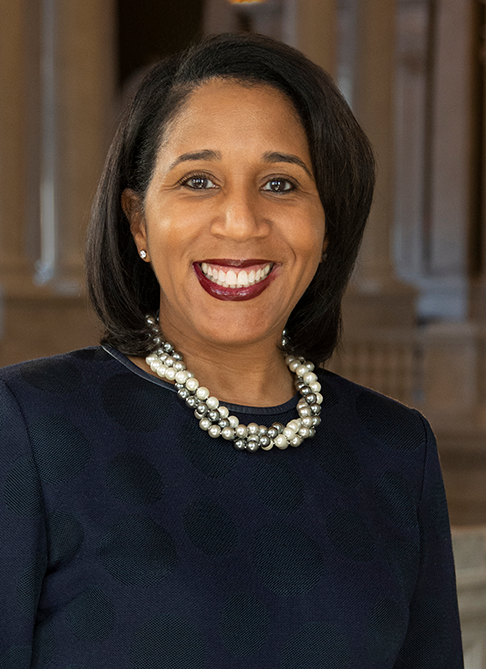
On Monday evening April 6, Karyn Temple '97, Global General Counsel of the Motion Picture Association of America and former Register of Copyrights, will give the 33rd annual Manges Lecture, "Whack-a-Mole: Has Section 512 of the DMCA Withstood the Test of Time?" We will be sending invitations shortly.
Coming Soon: Using Science to Authenticate Art
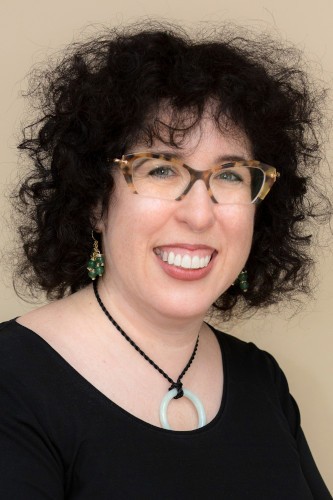
Jennifer Mass, President of Scientific Analysis of Fine Art, will speak March 5 on the uses of scientific techniques to authenticate works of art.
Alum Updates
Trey Hatch '01, has accepted a position as Vice President, Legal & Business Affairs with Warner Bros. International Television Distribution.
Are you an alum? Let us know what you've been up to!
